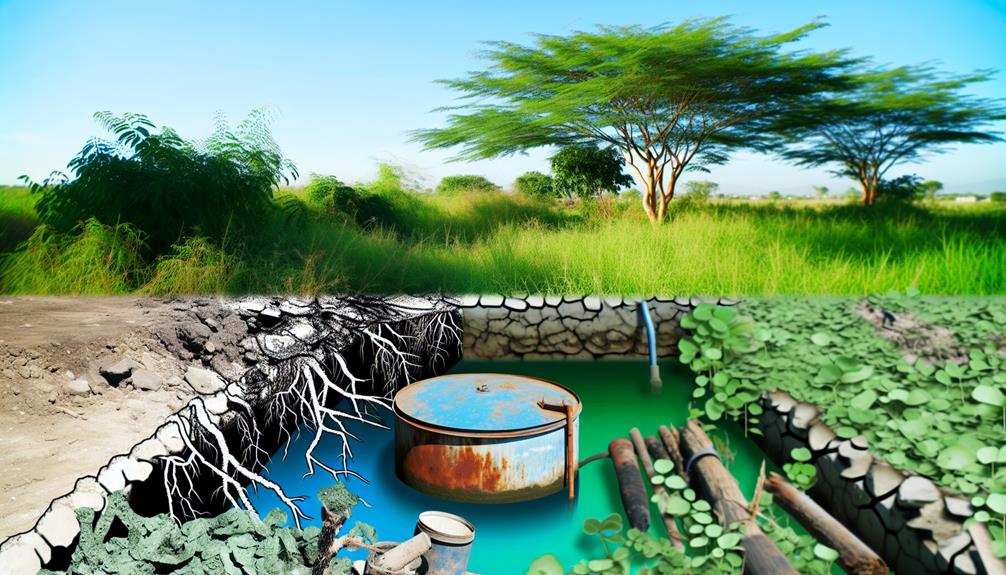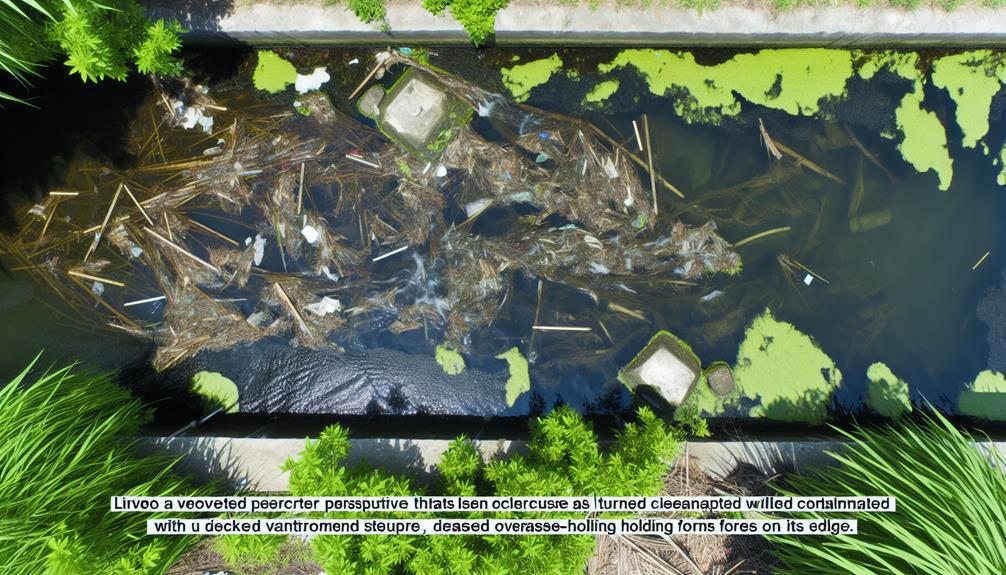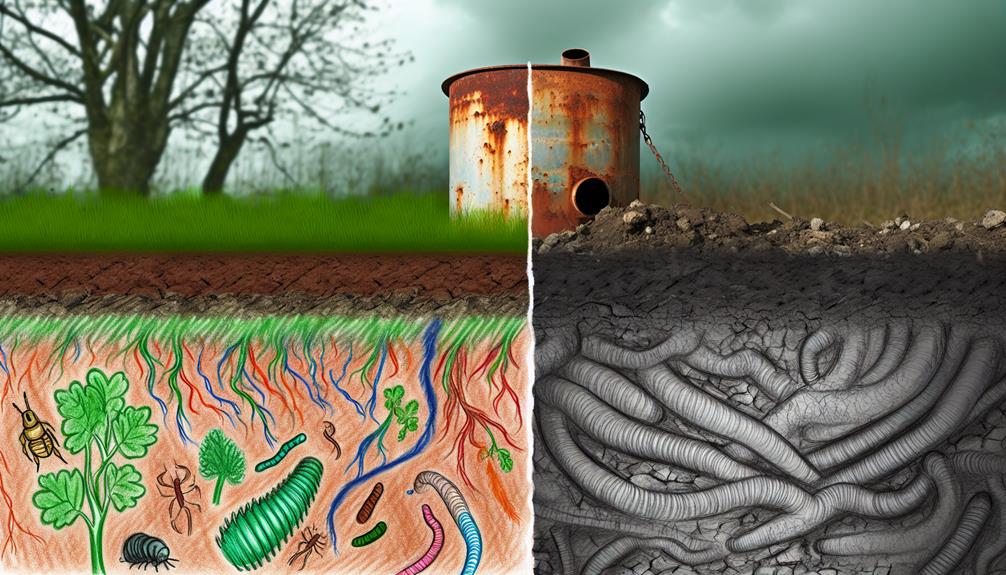Discover how to protect your septic system from breakdown with...
Read MoreYou & Your Septic Tank
What Are the Environmental Impacts of Septic Neglect?
Our professional septic service team offers comprehensive septic tank pumping services to keep your system running smoothly. Get a FREE Quote Today.

What Are the Environmental Impacts of Septic Neglect?
Just as the infamous iceberg brought down the Titanic, unseen problems lurking beneath the surface in the form of septic neglect can wreak havoc on our environment. You might be unaware, but failing to maintain your septic system can lead to some serious consequences.
We’re talking groundwater contamination, surface water pollution, soil degradation, and even devastating effects on local wildlife. And that’s not all, greenhouse gases from septic tanks can add to the already accelerating climate change.
You’ll want to stick around to get the full scoop on the environmental impacts of septic neglect, and trust me, you won’t believe the ripple effects this neglect can cause.
Key Takeaways
- Neglecting septic system maintenance can lead to expensive repairs and reduce its lifespan.
- Neglected septic systems can contaminate nearby bodies of water, leading to algal blooms and waterborne diseases.
- Groundwater contamination risks increase with septic neglect, posing health risks to humans and the environment.
- Neglected septic systems contribute to surface water pollution, harming aquatic life and turning drinking water into a health hazard.
Understanding Septic Tank Neglect

If you’re ignoring the regular maintenance of your septic tank, you’re inadvertently contributing to an array of environmental issues, as neglect can lead to harmful leaks and spills. This neglect directly impacts the septic system lifespan, and the maintenance importance can’t be overstated.
A well-maintained septic system can last anywhere between 25 to 30 years, but neglecting maintenance can drastically reduce this lifespan. Not only can this lead to expensive repairs, but also to potential groundwater contamination, posing serious health risks for both humans and wildlife.
Research finds that regular pumping of the septic tank, ideally every three to five years, is essential to maintain its functionality and prolong its lifespan. Ignoring this simple maintenance step can lead to solids buildup, causing the system to fail and leak untreated wastewater.
This leakage can contaminate nearby bodies of water, causing algal blooms and killing off aquatic life. It’s also a significant contributor to the spread of waterborne diseases.
Groundwater Contamination Risks
Without proper septic system maintenance, you’re putting our groundwater at risk for contamination, an issue that has far-reaching implications for both human health and the environment. Septic system neglect can lead to the leakage of harmful bacteria and pathogens into our groundwater, exacerbating public health implications.
Research shows that when septic systems fail, untreated household wastewater can infiltrate groundwater resources. This leads to a high risk of spreading diseases such as hepatitis, dysentery, and other gastrointestinal disorders. Additionally, this contamination has detrimental effects on the environment, including the degradation of aquatic ecosystems and the disruption of food chains.
However, it’s worth noting that these risks can be mitigated through strict adherence to septic system regulations. These regulations aren’t just arbitrary rules, they’re protective measures designed to ensure the safe disposal of waste and to protect our groundwater from pollution.
Surface Water Pollution Consequences

You’re now facing the grim realities of surface water pollution. Stagnant contaminants in local streams aren’t just unsightly, they’re devastating to aquatic life.
But it’s not just the fish that suffer; it also taints our drinking water, turning a vital resource into a potential health hazard.
Contaminants in Local Streams
The neglect of septic systems can unleash a silent yet potent enemy into our local streams, turning them into hotspots of dangerous contaminants. These pollutants deeply affect stream biodiversity and intensify erosion effects. They alter the ecological balance, endangering both aquatic and terrestrial life.
To paint a clearer picture for you, consider these implications:
- Contaminants such as nitrates and phosphates can cause algal blooms, leading to oxygen depletion in water bodies. This can result in mass fish kills and a drastic decrease in biodiversity.
- Erosion effects are amplified as vegetation dies off due to toxicity, leaving the soil bare and more susceptible to being washed away.
- Polluted streams can contaminate groundwater sources, posing serious health risks to humans and wildlife alike.
This is the grim reality of septic neglect and the damage it causes to our local streams.
Impact on Aquatic Life
Building on the issue of contaminants in local streams, let’s now examine in detail how septic neglect specifically wreaks havoc on aquatic life, underscoring the consequences of surface water pollution. When you ignore proper septic system maintenance, harmful bacteria and nutrients can seep into nearby water bodies, leading to algal blooms. These blooms, in turn, deplete oxygen levels and harm aquatic organisms, resulting in biodiversity loss.
Here’s a glimpse of the grim picture:
| Impact | Consequence |
|---|---|
| Algal Blooms | Depletes oxygen, harms aquatic life |
| Biodiversity Loss | Reduces species richness and health of ecosystems |
| Water Contamination | Threatens aquatic life and human health |
| Habitat Destruction | Disrupts life cycles of aquatic organisms |
It’s clear that septic neglect doesn’t just affect you; it’s a ripple effect that devastates entire aquatic ecosystems.
Drinking Water Contamination
While it’s clear that aquatic life suffers greatly due to septic neglect, it’s equally important to recognize how this neglect can also compromise our drinking water, making a direct impact on human health. Unchecked septic systems can lead to the leakage of harmful pathogens and chemicals into our water supplies, posing serious threats to public health.
- Public Health: Contaminated water can lead to the spread of diseases such as cholera, typhoid, and dysentery. Even minor exposure can result in illnesses like gastroenteritis.
- Agricultural Impact: Pollutants from neglected septic systems can seep into the soil, thereby contaminating crops. This not only hinders agricultural productivity but also poses risks to consumers of such produce.
Soil Degradation Due to Septic Neglect

In light of septic neglect, you’ll notice a substantial degradation in soil quality, posing a significant risk to both agricultural productivity and ecosystem health. When septic systems are not properly maintained, harmful substances can leak into the surrounding soil, altering its structure and fertility.
The table below provides an overview of the potential impacts of septic neglect on soil health:
| Potential Impact | Explanation | Health Implications |
|---|---|---|
| Nutrient Imbalance | Over-saturation of nutrients from waste can lead to excessive plant growth, disrupting ecosystem balance. | Can lead to algal blooms in nearby water bodies, impacting aquatic life and potentially human health. |
| Soil Contamination | Harmful bacteria and pathogens can infiltrate the soil. | Can lead to diseases in humans and animals who consume contaminated produce. |
| Soil Structure Alteration | The infiltration of wastewater can change the soil’s physical properties, affecting its ability to support plant life. | Can lead to reduced agricultural productivity and food security. |
To mitigate these impacts, it’s crucial to adopt better septic maintenance practices. Regular inspections, pumping, and repairs can prevent system failures, safeguarding the health of our soils, ecosystems, and communities. Remember, healthy soil is not just about what we see on the surface; it’s about the life that thrives beneath.
Impact on Local Wildlife
You mightn’t consider the effect on local wildlife when you neglect your septic system, but the impacts are significant.
Contaminated water sources, often a direct result of septic neglect, can poison animals and disrupt delicate ecosystems.
Furthermore, the destruction of habitats and increased risk of disease transmission can lead to declines in wildlife populations, disrupting the balance of your local environment.
Contaminated Water Sources
Septic neglect’s detrimental role in water contamination profoundly disrupts local wildlife ecosystems, altering their natural behavior and threatening their survival. Ignoring septic regulations, your septic system could overflow, seeping harmful bacteria into nearby water sources. This can trigger the outbreak of waterborne diseases, affecting not only humans but also animals that rely on these water sources.
Here’s what this can lead to in more detail:
- Animals, especially aquatic species, may suffer from diseases, leading to a decrease in their population and imbalance in the ecosystem.
- Predators consuming infected prey may also contract diseases, affecting their health and breeding capabilities.
- The quality of habitats diminishes, altering the natural behavior of wildlife, forcing them to migrate or face extinction.
Your actions have a far-reaching impact, and it’s essential to understand and act responsibly.
Habitat Destruction
Over time, neglecting your septic system can lead to significant habitat destruction, drastically disrupting the local wildlife and leading to potentially irreversible ecological damage. This neglect often results in land encroachment, as septic waste can spread, transforming previously untouched areas into hazardous zones.
This encroachment can cause an ecosystem imbalance, as species are displaced or threatened by the toxins present in septic waste. This imbalance can have cascading effects, disrupting the food chain and altering the natural environment.
| Consequence | Effect | Result |
|---|---|---|
| Land Encroachment | Spreading of septic waste | Creation of hazardous zones |
| Ecosystem Imbalance | Displacement of species | Disruption of food chain |
| Habitat Destruction | Alteration of natural environment | Irreversible ecological damage |
Disease Transmission Risks
Undeniably, the unchecked spread of septic waste poses a significant risk to local wildlife through the potential transmission of harmful diseases. This issue doesn’t just harm the animals—it has public health implications for humans too.
To understand the gravity, consider these points:
- Contaminated water sources can become breeding grounds for disease vectors, affecting both wildlife and humans.
- Disease transmission from wildlife to humans, known as zoonotic diseases, can be fatal.
- The proliferation of these diseases can be an indicator of the need for sanitation infrastructure improvement.
Proper septic management is crucial to prevent disease spread and maintain a healthy ecosystem. It’s not just about protecting wildlife—it’s about safeguarding our health too.
Greenhouse Gas Emissions From Septic Tanks
When you neglect regular maintenance of your septic tank, it can become a significant contributor to greenhouse gas emissions. Specifically, methane production can increase substantially when septic systems aren’t properly maintained. This potent greenhouse gas is produced by the breakdown of organic materials in the tank. Methane’s warming potential is 25 times greater than carbon dioxide over a 100-year period, dramatically escalating your carbon footprint.
Septic tank neglect can lead to an anaerobic environment, where oxygen is limited or absent. This condition fosters the growth of methanogenic bacteria, which produce methane as a byproduct. The methane then escapes into the atmosphere, contributing to the greenhouse effect and global warming.
Moreover, inefficient septic systems can also produce nitrous oxide, another powerful greenhouse gas with a warming potential approximately 300 times that of carbon dioxide. This occurs when nitrogenous compounds in the wastewater aren’t adequately treated.
Conclusion
So, you thought ignoring your septic maintenance was a harmless shortcut, didn’t you? Well, think again.
Your negligence isn’t just ruining your backyard, it’s contaminating groundwater, polluting surface water, degrading soil, harming wildlife, and boosting greenhouse gas emissions. Quite the domino effect, isn’t it?
Your small oversight is contributing to a big environmental crisis. So much for that ‘harmless’ shortcut. The irony is, the very thing you neglect is silently impacting your planet.
You may also like...
Why Are DIY Fixes Essential for Septic Tank Pumping?
Tap into the importance of DIY fixes for septic tank...
Read MoreUnveiling the Average Costs of Septic Tank Pumping
Master the mysteries of septic tank pumping costs and avoid...
Read More
The Best Septic Tank Pumping Services Near You

Answer Some Questions
Let us know about your needs so we can find you the right septic tank pros.

Get Quotes
We will put you in touch with the right septic tank pros for your job and location.

Hire Right
Compare quotes, message or call pros, and hire only when ready.



